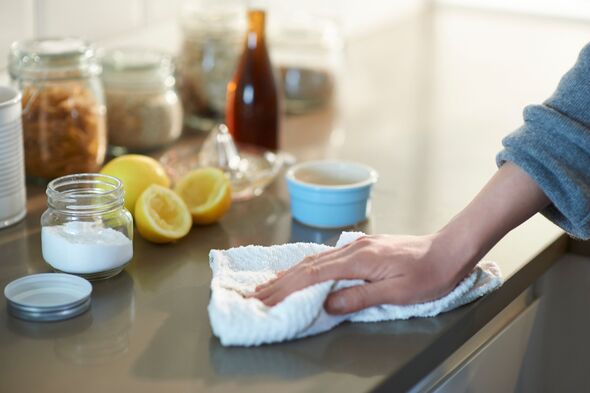Lifestyle
Acidic Cleaners Threaten Your Kitchen Countertops: Expert Warns

Common household cleaning products, particularly those containing vinegar, may be causing significant damage to kitchen countertops. Caitlin King, CEO of Wrap Your Kitchen, a company specializing in kitchen transformations, has raised concerns about the effects of acidic cleaners on various countertop materials. While vinegar is often praised for its antibacterial properties, its acidic nature can strip away protective sealants, ultimately harming the surface rather than cleaning it.
Understanding the Risks of Using Vinegar
Vinegar is popular among consumers due to its low cost and natural cleaning capabilities. King explains, “Vinegar is incredibly popular because it ticks so many boxes. It’s cheap, it’s natural, and it does kill bacteria. But what people don’t realize is that it’s far too harsh for most kitchen surfaces.” The very qualities that make vinegar an effective cleaner can also lead to damaging effects over time.
Natural stone countertops, such as granite and marble, are particularly vulnerable to vinegar’s corrosive action. According to King, the acid reacts with the calcium carbonate present in these stones, causing etching and permanent dull spots. “The damage isn’t always obvious straight away,” she adds. “You might not notice it after one or two uses. But over weeks and months, you’ll start to see the surface looking duller. The shine disappears. Colors can fade.”
Once the sealant is compromised, countertops become susceptible to a range of issues, including water damage, staining, and even the growth of bacteria. King cites instances where clients were puzzled by the poor condition of their relatively new kitchens. Upon investigation, the issue often stemmed from their choice of cleaning products. “Switching products made all the difference,” she recalls.
Recommended Alternatives for Kitchen Cleaning
For effective daily cleaning, King suggests using warm water and mild dish soap. “It sounds too simple to be true, but it works beautifully on virtually every surface type,” she states. For tougher stains or sticky residues, she recommends pH-neutral cleaners specifically designed for kitchen surfaces.
In addition, King emphasizes the importance of addressing spills promptly, especially those from acidic substances like wine, coffee, or fruit juice. She advises against letting spills sit on the surface and recommends using a soft cloth instead of abrasive materials. “These small habits make a massive difference to how long your countertops stay looking good,” she quips.
In conclusion, while vinegar may seem like a convenient and effective cleaning solution, homeowners should consider the long-term implications of its use on kitchen surfaces. By opting for gentler cleaning methods, individuals can preserve the appearance and integrity of their countertops, ensuring they remain beautiful and functional for years to come.
-

 Business2 weeks ago
Business2 weeks agoForeign Inflows into Japan Stocks Surge to ¥1.34 Trillion
-

 Top Stories3 weeks ago
Top Stories3 weeks agoMarc Buoniconti’s Legacy: 40 Years Later, Lives Transformed
-

 Health3 weeks ago
Health3 weeks agoInnovative Surgery Restores Confidence for Breast Cancer Patients
-

 Sports1 month ago
Sports1 month agoSteve Kerr Supports Jonathan Kuminga After Ejection in Preseason Game
-

 Top Stories3 weeks ago
Top Stories3 weeks agoBOYNEXTDOOR’s Jaehyun Faces Backlash Amid BTS-TWICE Controversy
-

 Science2 weeks ago
Science2 weeks agoUniversity of Hawaiʻi Joins $25.6M AI Project to Monitor Disasters
-

 Science1 month ago
Science1 month agoChicago’s Viral ‘Rat Hole’ Likely Created by Squirrel, Study Reveals
-

 Lifestyle1 month ago
Lifestyle1 month agoKelsea Ballerini Launches ‘Burn the Baggage’ Candle with Ranger Station
-

 Entertainment1 month ago
Entertainment1 month agoZoe Saldana Advocates for James Cameron’s Avatar Documentary
-

 Top Stories3 weeks ago
Top Stories3 weeks agoCarson Wentz Out for Season After Shoulder Surgery: Urgent Update
-

 Politics1 month ago
Politics1 month agoDallin H. Oaks Assumes Leadership of Latter-day Saints Church
-

 Lifestyle1 month ago
Lifestyle1 month agoDua Lipa Celebrates Passing GCSE Spanish During World Tour









